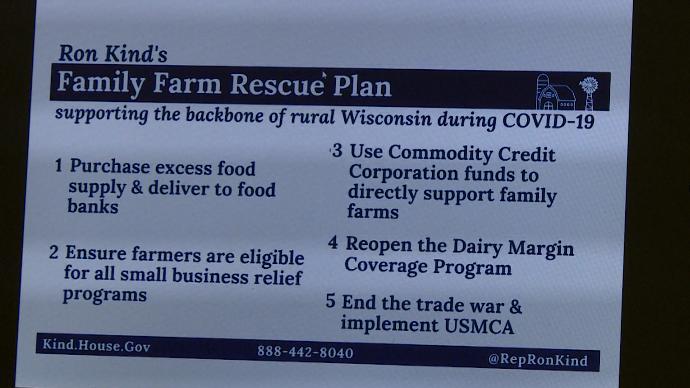Rep. Ron Kind’s Family Farm Rescue Plan includes five steps
By Diego Flammini
Staff Writer
Farms.com
A member of Congress has introduced a five-step approach to help farmers overcome the challenges brought on by the COVID-19 pandemic.
Democratic Congressman Ron Kind, who represents Wisconsin’s Third Congressional District, unveiled his Family Farm Rescue Plan during a conference call on Thursday.
The five-part plan calls for the Trump administration to take certain measures and implement trade agreements to assist U.S. farmers, and it doesn’t require any new legislation or government funding.

“All of these are steps that the administration can take today if they choose and that’s why I think it’s so critical that we get out and start doing something,” he said during the call, WEAU reported. “Even if some of these (ideas) fail, let’s try something else. Now is not the time for inaction.”
The first part of Kind’s plan asks for the USDA to purchase excess food supplies and deliver it to food banks.
That step already appears to be in motion.
During an interview on Fox Business on Wednesday, Agriculture Secretary Sonny Perdue implied his department would spend almost US$16 billion to purchase excess dairy and meat products.
“We want to purchase as much of this milk, or other protein products, hams and pork products, and move them into where they can be utilized in our food banks, and possibly even into international humanitarian aid,” Perdue said.
The second part of Kind’s farm plan is to make sure farmers are eligible for all small business relief programs.
Of President Trump’s US$2-trillion stimulus package, about US$349 billion has been set aside for these types of programs.
Currently, farm businesses with 500 or fewer employees or that meet certain criteria are eligible for the Paycheck Protection Program.
Some programs, like the Economic Injury Disaster Loan Program, which provides up to US$10,000 of economic relief grants to businesses, isn’t available to farmers.
Industry organizations like the American Farm Bureau Federation, the National Corn Growers Association and the National Cattlemen’s Beef Association are working to have that changed.
The third piece of Rep. Kind’s Family Farm Rescue Plan uses Commodity Credit Corporation (CCC) funds to directly support family farms.
Within the federal stimulus package, US$14 billion was earmarked for the CCC, which makes payments to producers and helps protect farm income and prices.
No details about how that money will be used have been released yet.
The fourth component of Rep. Kind’s plan is to reopen the Dairy Margin Coverage Program.
The voluntary program provides dairy farmers with risk management coverage that pays producers when the difference between the national price of milk and the average cost of feed falls below certain levels based on purchased coverage.
Farmers had until Dec. 13, 2019 to sign up for the program, and Agriculture Secretary Perdue may not authorize another sign-up opportunity.
The program is an insurance program and farmers should have it before they need it, Perdue said.
The final part of Rep. Kind’s plan asks the Trump administration to end trade wars and implement the USMCA.
Canada, the United States and Mexico have each passed domestic legislation ratifying the agreement.